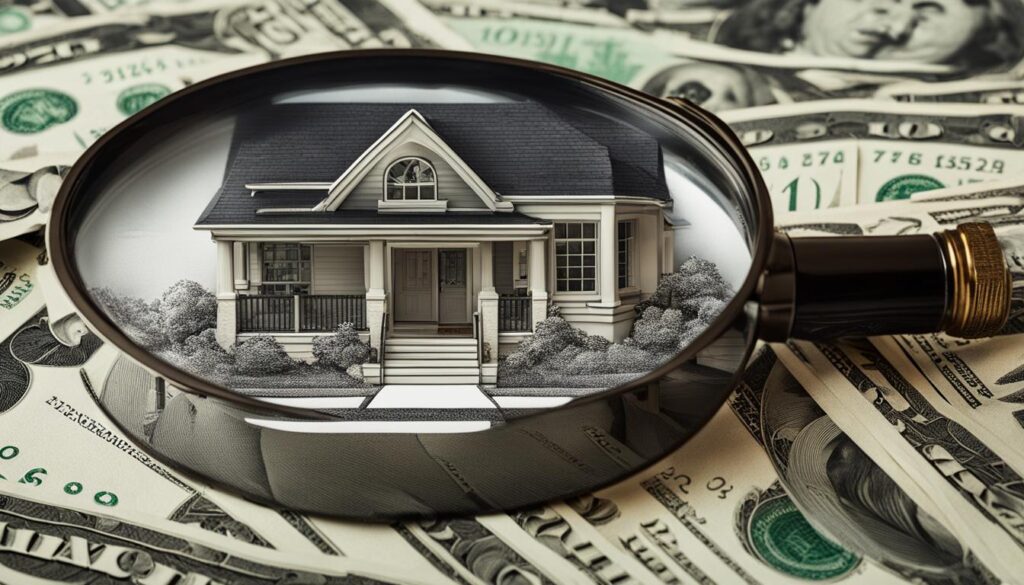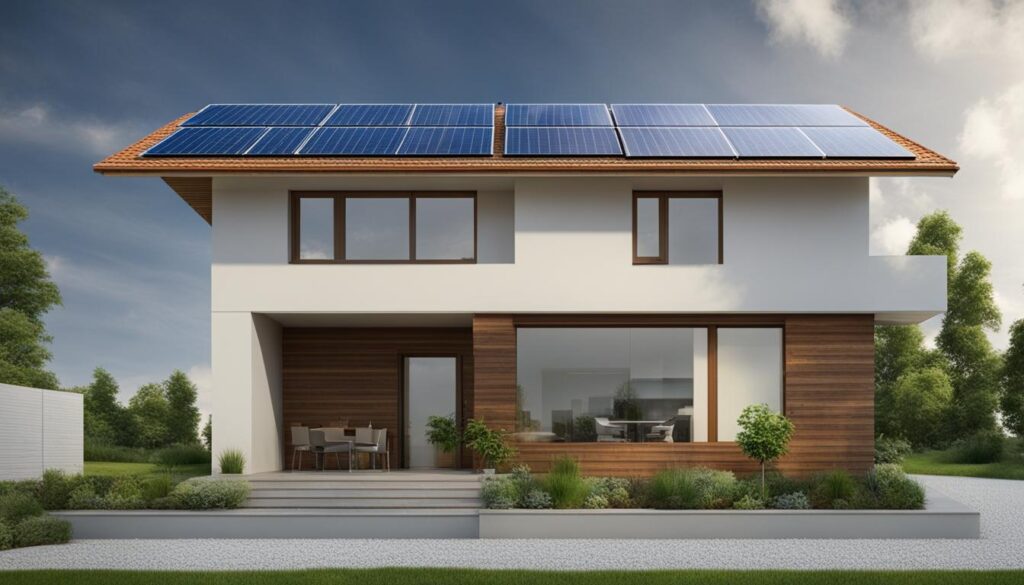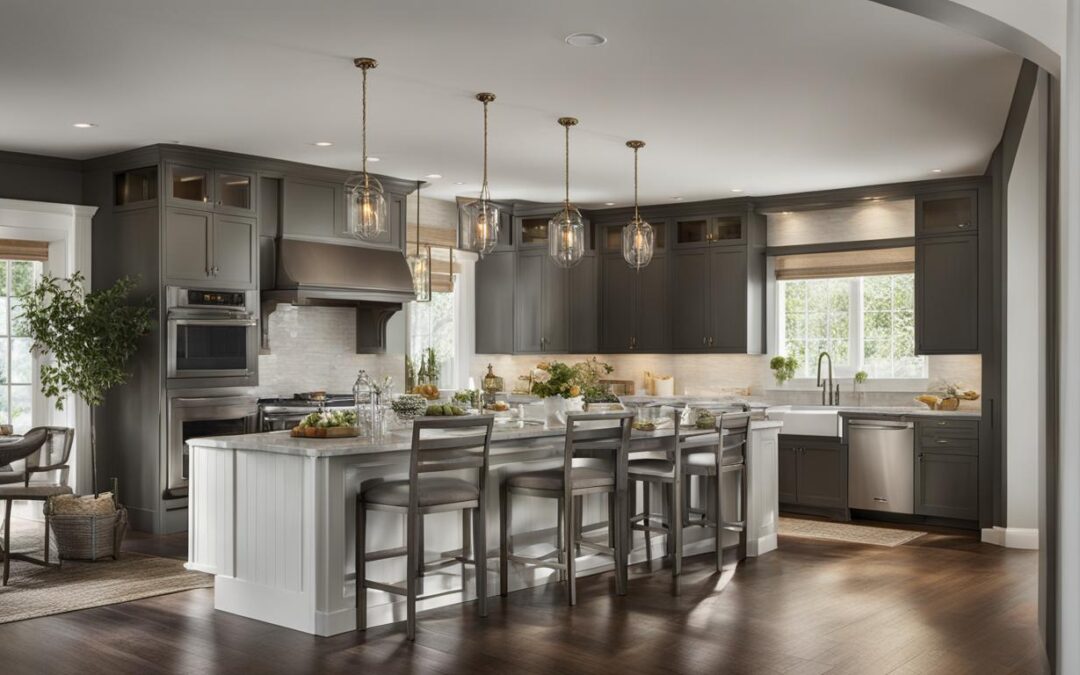Embarking on the journey of purchasing a home is often filled with excitement and anticipation. However, savvy buyers know that the sticker price is just the beginning. There’s a myriad of hidden home buying costs that can catch even the most prepared individuals by surprise. These unexpected homeownership expenses range from upfront outlays to ongoing fiscal commitments that are essential parts of finance in real estate.
Before you make an offer on that dream property, understanding the full spectrum of financial responsibilities is key. It’s the less visible costs like inspection fees, property taxes, and insurance that can make a significant difference in your budget. This introductory guide sheds light on those hidden figures, offering a clearer view of the true cost of home buying.
Understanding Down Payments and Mortgage Fees
When venturing into the realm of homeownership, the financial landscape can be intricate, with mortgage financing forming the bedrock of the purchase. A key player in this process is the down payment, a portion of the home’s price paid upfront, which significantly influences the lifecycle of a mortgage.
The Impact of Higher Down Payments on Overall Costs
The Mortgage Bankers Association highlights that a higher down payment can ameliorate subsequent mortgage repayments, potentially leading to more favorable loan terms. The weight of the down payment inversely affects private mortgage insurance (PMI) premiums, often required when the down payment is less than 20% of the home’s value.
Assorted Fees Within Mortgage Transactions
It’s pivotal for potential homeowners to factor in various transaction fees. According to the Federal Reserve, closing a mortgage deal involves expenses such as loan origination fees and processing charges. The Consumer Financial Protection Bureau elucidates further on the role of PMI, accentuating its impact on monthly expenses for those who cannot meet the 20% threshold. Understanding these fees is crucial to foreseeing the true cost of mortgage financing and planning accordingly.
Cast a keen eye on the entirety of mortgage-related expenses to steer clear of any unforeseen financial burdens, ensuring a smoother journey towards securing your dream home.
Inspection and Appraisal: Essential Yet Often Overlooked Expenses
When it comes to due diligence in home buying, understanding potential home inspection costs and real estate appraisal fees is crucial for prospective homeowners. Often, these expenses can be overshadowed by the more obvious costs of purchasing a home, yet they play a vital role in the buying process. The American Society of Home Inspectors emphasizes the importance of a thorough inspection, not only for peace of mind but also to avoid costly repairs down the line. Typically, potential homeowners might find themselves spending anywhere from a few hundred dollars to over a thousand, depending on the size and condition of the property.
Home inspections can reveal hidden issues that could significantly impact your investment, making them an indispensable element of buying a home with confidence. On the other side of the coin, the Appraisal Institute informs potential buyers about the necessity of a professional appraisal. Appraisal fees contribute to the total real estate appraisal fees and are required by lenders to determine the property’s value, ensuring the loan amount does not exceed the home’s worth.
While some may see these costs as merely additional expense, they are, in essence, a safeguard that contributes to informed decision-making. Without a proper appraisal, you might overpay for your home, affecting not only your wallet but your financial stability in the long term. Similarly, skipping a home inspection to save a few hundred dollars could result in unforeseen repairs costing much more. As such, due diligence in home buying is about investing wisely in the services that will protect your investment and ensure no surprises await after the papers are signed.
Being diligent upfront can save you from unwelcome future expenses and ensure you make a sound real estate investment. – American Society of Home Inspectors
Remember, these costs are not just formalities; they are concrete steps in protecting your investment and setting the stage for a successful home purchase. Ensure that when budgeting for your new home, home inspection costs and real estate appraisal fees are part of your financial plan. It’s the savvy way to enter into one of the most significant investments of your life.
Property Taxes: A Recurring Cost with Long-Term Implications
Understanding the property tax implications on your new home purchase is vital to budgeting for the fiscal responsibilities of homeownership. These annual taxes are a cornerstone of local government funding, affecting community services and infrastructure. However, as a homeowner, it’s important to recognize that property tax is not a static expense—it can vary year to year, potentially impacting your finances.
How Property Taxes Can Fluctuate After Purchase
Following the purchase of your home, you might notice changes in your property tax bills. Various factors including reassessment of property value, changes in tax laws, and shifting budget requirements for your community can lead to either an increase or decrease in taxes. The Tax Foundation outlines that an accurate assessment of current and historical tax rates is key in predicting these potential changes.
Assessing Your Tax Liability Before Buying a Home
Before making a long-term investment in real estate, pinpointing your potential tax obligations should sit high on your checklist. Utilizing local government resources can help in **assessing the home value** and estimating property tax liability. These tools often incorporate historical tax data and may provide property tax estimators, giving you a clearer picture of the recurring costs you will face as a homeowner. Being well-informed about these fiscal duties ensures that you are better equipped to manage the associated expenses of your property investment.

Homeowners Insurance and Potential Surprises
Understanding homeowners insurance is a crucial step in protecting your investment. Although it’s often viewed as a standard part of owning a home, the intricacies of insurance policies can unveil unexpected nuances that may impact your financial well-being. In this section, we delve into what influences insurance premiums and explore the often-overlooked, yet significant realm of additional insurance endorsements.
Factors That Influence Homeowners Insurance Rates
Several elements can affect the cost of your homeowners insurance. The National Association of Insurance Commissioners provides insights on how location, home size, and age can determine your premiums. However, it isn’t just about the house—it’s also about its contents and your personal risk profile. For instance, owning high-value items or having a history of multiple insurance claims could lead to higher premiums. It’s essential for homeowners to be aware of these impacts to avoid unwelcome surprises in their insurance costs.
Additional Coverage and Endorsements to Consider
While standard homeowners insurance covers a wide range of possible damages, it’s not all-encompassing. The Insurance Information Institute suggests carefully evaluating your policy for possible gaps where additional insurance endorsements could be beneficial. Adding coverage for natural disasters, such as floods or earthquakes, or getting extra liability protection, could offer peace of mind and save significant costs in the future. It’s all about tailoring your policy to fit the unique needs and risks of your household.
Mindfully navigating through the nuances of homeowners insurance ensures that you are neither underinsured nor paying for unnecessary coverage. Stay informed, review your policy regularly, and consider endorsements that align with your circumstances for optimal protection.
Closing Costs: A Buyer’s Array of Fees and Services
When you finalize a real estate transaction, you’re introduced to closing costs, an assortment of necessary fees and services that pave the way to home ownership. Understanding these buyer’s expenses is crucial to accurately budget for your purchase and avoid unexpected financial strain. The Federal Housing Finance Agency lists several common closing costs such as title searches, necessary to establish ownership, and attorney fees, for ensuring a legally sound transfer of property.
Closing costs can significantly impact your purchasing power, often ranging between 2% to 5% of the home’s purchase price. These fees encompass items like escrow charges, notary fees, and home warranty plans, all integral to the sale’s success. Given that these costs can mount quickly, preparing for them will provide you with a clearer financial picture as you step into the role of a homeowner.
Remember, while some services within closing costs are non-negotiable, others offer room for shopping around. Doing so could potentially save you a small fortune on your journey to buying a home.
Maintenance and Repairs: The Inevitable Homeowner’s Burden
Embarking on homeownership is as much about the aesthetic and functional aspects of your new dwelling as it is about financial foresight. A realistic projection of home maintenance costs and unexpected repair expenses is not just advisable—it’s indispensable. By including home upkeep budgeting in your financial planning, you can safeguard your investment and ensure a stable, less stressful homeownership experience.
Planning for Routine Upkeep and Sudden Repairs
The National Association of Home Builders emphasizes the significance of setting aside funds for the upkeep of your property. Regular maintenance tasks, such as cleaning gutters, servicing HVAC units, and refreshing paint, are predictable expenditures that should feature in your budget. However, life often throws curveballs, and your home is not immune to them. For instance, the sudden failure of a water heater or a leaky roof can result in hefty, unplanned expenses. Therefore, cultivating a robust home maintenance fund is a stroke of financial prudence that shields you from the shock of unforeseen costs.
Lifespan of Appliances and Systems in Your New Home
Consumer Reports offers insights that can aid in forecasting future expenses, drawing attention to the life expectancy of major home systems and appliances. By understanding that a furnace may last 15-20 years, while a washer may require replacement after a decade, you can stagger your savings and avoid the brunt of back-to-back unexpected repair expenses. Anticipating and preparing for these eventualities in your home upkeep budgeting is like building a financial defense against the inevitable wear and tear that comes with time.
For new homeowners, your sanctuary’s longevity corresponds directly with your commitment to its care. Regular maintenance doesn’t just prevent bigger issues in the long run; it also offers a sense of peace knowing that you are well-prepared for the responsibilities that come with owning your corner of the world.
HOA Fees and Special Assessments in Managed Communities
When considering a move into a managed community, prospective homeowners are sometimes surprised by the additional costs associated with Homeowners Association (HOA) fees. These fees are essential for the maintenance and management of common areas, amenities, and certain utilities, ensuring that community standards are upheld, and property values are protected. The Community Associations Institute sheds light on how HOA fees contribute to the overall community living costs, which can include landscaping, security, community pool maintenance, and even garbage collection, among others.
Special assessments are another financial aspect that homeowners may face. These are levied when unexpected costs arise or when the HOA reserve funds fall short for major repairs or improvements. For instance, a storm might cause damage that wasn’t anticipated, leading to additional costs for repairs. Homeowners might be required to pay these assessments in a lump sum or through an incremental payment plan. It’s crucial for homeowners to not only understand their monthly HOA fees but also to inquire about the community’s history and potential for special assessments to anticipate future expenses accurately.
While HOA fees and special assessments are an integral part of living in a managed community, it is important for homeowners to review the HOA’s financial statements, reserve funds, and meeting minutes. This level of due diligence can provide invaluable insights into the fiscal health of the association and forecast potential special assessments. With this information in hand, homeowners can make informed decisions and budget accordingly for their slice of community living.
Remember, HOA fees and special assessments are investments into the community and, by extension, into the value of your property; understanding and anticipating these costs are essential to avoid surprises and to maintain the lifestyle and amenities that you enjoy.
Renovation and Customization Costs Post-Purchase
After the exhilarating process of purchasing a new home, many homeowners find themselves eager to personalize their space, which often involves renovations and custom touches. Understanding home renovation costs and properly planning your budget for home improvements can prevent financial overreach and ensure your home not only reflects your personal style but also remains a sound investment.
Evaluating Renovation Needs Before Closing the Deal
Prior to finalizing your home purchase, it’s crucial to assess the property for potential renovations it may need. Whether it’s a dated kitchen or an underwhelming living space, identifying these requirements can help you gauge the scope and feasibility of upcoming projects. The National Association of the Remodeling Industry suggests homeowners anticipate average home renovation costs to effectively allocate resources for each project phase.
Setting Aside a Budget for Personalizing Your Home
Once you’ve identified your renovation needs, the next step is to set aside a budget for personalizing your home. Transitioning from a blank canvas to a reflection of your personal taste can be a financial undertaking. HomeAdvisor emphasizes the importance of a realistic budget, which takes into consideration both material and labor costs, thereby avoiding surprises and helping maintain your financial integrity while customizing a new home.
Investing in one’s home is not merely a financial decision, but a personal one. The spaces we inhabit should inspire joy and comfort, tailored to the unique needs and tastes of the homeowner.
Utility Set-Up and Ongoing Costs After Moving In
Relocating to your new home brings a fresh set of financial responsibilities—among them the essential utility costs and home service fees. As you settle in, understanding these expenses is critical for budgeting and can significantly affect your monthly outlay. To help manage these costs effectively, one must consider the energy efficiency savings that can be accrued over time.
Energy Efficiency and Its Effect on Monthly Utilities
Utility costs can be one of the more variable post-purchase expenses a homeowner will face. The U.S. Department of Energy emphasizes that energy-efficient appliances and home improvements can lead to substantial savings on utility bills. Simple measures such as LED lighting, energy-efficient window installations, and programmable thermostats not only enhance comfort but also bring about significant energy efficiency savings. As utility prices fluctuate, these investments can provide a cushion against rising energy costs.
Initial Fees for Setting Up Home Services
Upon moving in, homeowners often encounter initial service fees to establish utilities. Local utility companies generally publish these costs, enabling new homeowners to anticipate and prepare for them. Fees for connecting electricity, water, gas, and internet services can quickly add up, and so it’s advisable to allocate a portion of your moving budget for these home service fees. By familiarizing yourself with these costs in advance, you can avoid any unexpected financial surprises during your transition into homeownership.

Finance: The Role it Plays in the Total Cost of Home Ownership
Navigating the realm of homeownership can certainly be complex, with finance playing a pivotal role. A sound mortgage finance strategy is critical in managing long-term homeownership costs. As a prospective buyer, it’s important to understand the nuances of mortgage rates and how they can influence the overall expense involved with owning a property. The right financial approach can ultimately make the difference between a wise investment and a burdensome expense.
Interest Rates and Their Long-Term Impact on Your Finances
Interest rates are the pulse of the mortgage world, dictating the rhythm at which your repayments evolve over the lifespan of your loan. Data from the Federal Reserve Economic Data (FRED) underscores the significance of interest rate effects on the cost of homeownership. A lower interest rate means reduced monthly payments and substantial savings over time, whereas a higher rate can dramatically increase the total amount paid back to the lender. Therefore, locking in a favorable rate is crucial.
Finding the Right Mortgage to Fit Your Financial Strategy
The Consumer Financial Protection Bureau highlights the importance of selecting a mortgage that aligns with your financial goals and capabilities. With a myriad of mortgage options available, from fixed-rate to adjustable-rate mortgages, it becomes essential to compare and contrast these choices to find the best fit for your mortgage finance strategy. Taking the time to research and consult financial advisors can ensure that you embark on the path of homeownership with a solid, tailored plan in place.

